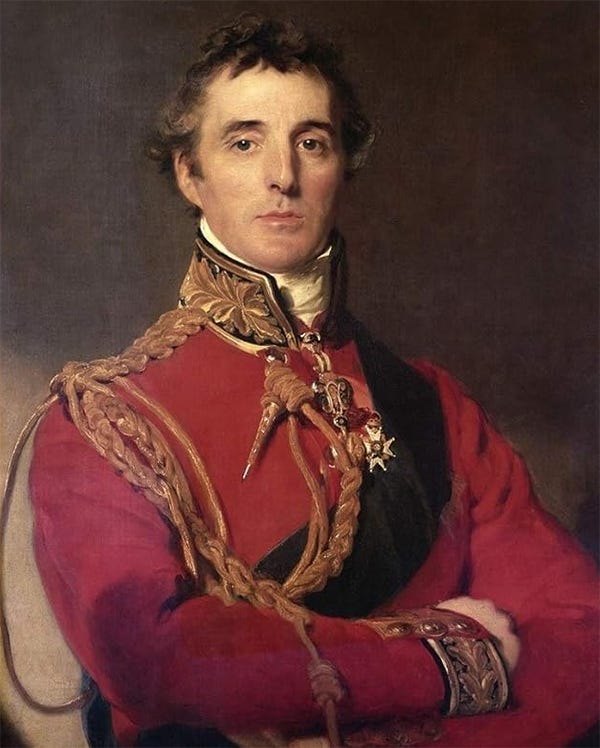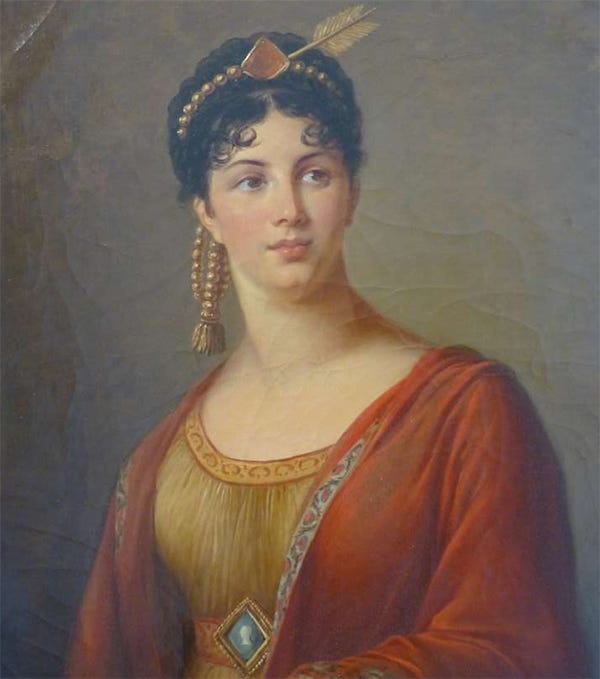A Historical Sigma
Wellington is one of the classic Sigmas of history
Arthur Wellesley, the British Field Marshal and 1st Duke of Wellington, was arguably the greatest military general of all time. He not only had a brilliant and unblemished military career, in which he defeated many of Napoleon’s great marshals, but defeated Napoleon himself at Waterloo.
At Castalia Library, we’ve been publishing daily excerpts from the exceptional STUDIES IN THE NAPOLEONIC WARS by the great military historian Sir Charles Oman, and one passage in particular stood out about Wellington’s unshakeable self-confidence.
A conversation which he held with Croker just before his departure chances to have been preserved in the latter’s diary, under the date June 14, 1808. After a long reverie he was asked the subject of his thoughts. “To say the truth”, he replied, “I am thinking of the French I am going to fight. I have not seen them since the campaign in Flanders (1794–5), when they were capital soldiers, and a dozen years of victory under Bonaparte must have made them better still. Tis enough to make one thoughtful. But though they may overwhelm me, I don’t think they will out-manoeuvre me. First, because I am not afraid of them, as everyone else seems to be; and secondly, because, if all I hear about their system is true, I think it a false one against steady troops. I suspect all the Continental armies are half-beaten before the battle begins. I at least will not be frightened beforehand.”
The astonishing success that Wellington achieved throughout the Peninsular War is difficult to grasp in its entirety. He was outnumbered and outgunned in almost every single battle he commanded. If he had made one single mistake, if he had suffered one single defeat, it is almost certain that the British Parliament would have forced him to withdraw and surrender both Portugal and Spain to the forces of the imperial French. And while he made a number of questionable decisions over the six years he commanded the allied forces in Spain and Portugal, and many of those decisions were openly criticized at the time, what ultimately mattered is that he never lost a battle.
But success does not make the Sigma. Could he not have been an Alpha? Definitely not. He had no great charisma. He was not loved by either his men or his officers, since he regularly hanged the former and harangued the latter whenever they fell short of his high personal standards. He was diffident, exacting, stingy of praise, viciously sarcastic, and openly despised everyone who he felt was less than entirely reliable.
He even insulted the entire Spanish military hierarchy by vehemently refusing to coordinate any of his actions with any of their generals after being disgusted by the lackluster Spanish performance in one of the early campaigns of the Peninsular War.
And yet, this is how one British officer, who admitted that he didn’t even like Wellington, felt about him.
“We would rather see his long nose in the sight than a reinforcement of ten thousand men.”
It is probably unnecessary to point out that the Iron Duke was a complete failure in politics. His brief term as Prime Minister was unremarkable and largely unsuccessful, which should come as no surprise since politics is an intrinsically hierarchical art. As for intersexual relations, Wellington’s behavior was observably that of a high-status gentleman.
Although his wife Catherine Pakenham, was both attentive and unswervingly loyal, the 46-year-old hero of Waterloo cared little for her, claiming only to have married the woman out of a sense of pity. Instead, Wellington lavished his attentions on much younger, attractive ladies. In fact, he spent his time leading up to the famous 1815 battle stealing tender moments with Frances Wedderburn-Webster, the striking young wife of a Brussels-based British aristocrat.
The Duke also carried on a famous long-time relationship with Harriet Arbuthnot, a married socialite 24 years his junior. Although he wrote Arbuthnot endlessly and claimed that she commanded his “deepest affection,” there is little evidence they were anything other than very close friends. The same cannot be said about the glamorous Italian opera star Giuseppina Grassini. While visiting Paris in 1822, Wellington fell for the 49-year-old contralto and the two were frequently seen out in public arm-in-arm.
Historical Sigma confirmed.




You have done these, and I'm sure will continue to do them, but portrait of a Sigma, portrait of an alpha, portrait of a delta perhaps, would be useful to see some historical examples with commentary on what specifically shows the behavior pattern.
I appreciate seeing these.
This historical sigma is to be admired but deltas and gammas that pine away wanting to be sigmas don’t get it. It’s a strange and lonely existence. Unless you are already inherently a sigma you really would not enjoy being one.